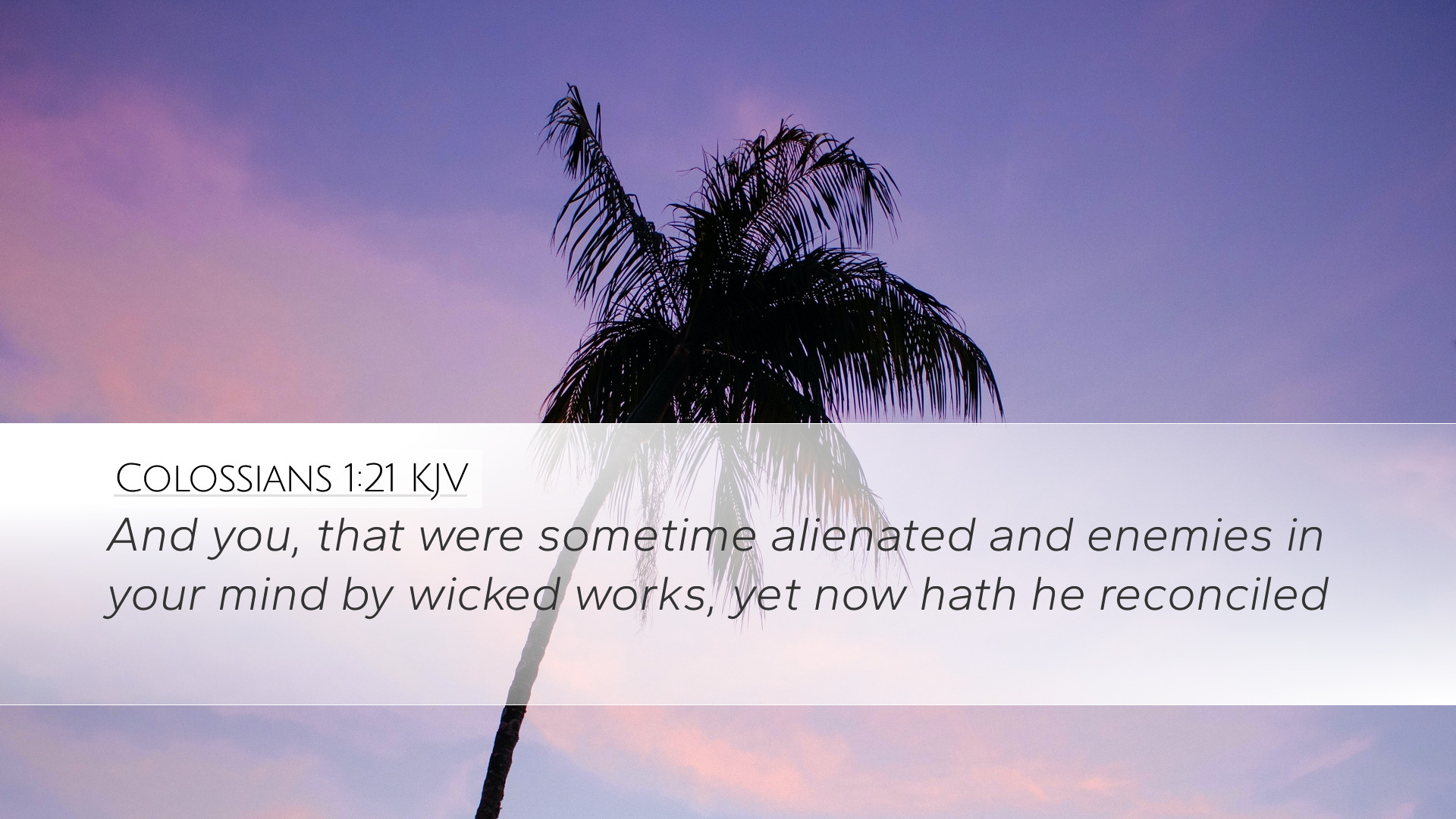Colossians 1:21 - Commentary
Verse Reference: Colossians 1:21 (KJV) - "And you, that were sometime alienated and enemies in your mind by wicked works, yet now hath he reconciled."
Introduction
The Apostle Paul, in his letter to the Colossians, addresses the profound theme of reconciliation with God. Colossians 1:21 is pivotal as it encapsulates the transformation of believers from enmity to harmony with the Divine. This commentary draws insights from esteemed public domain theologians such as Matthew Henry, Albert Barnes, and Adam Clarke, providing a rich exploration of the text in light of its doctrinal significance.
Contextual Background
This epistle was written during Paul's imprisonment, likely in Rome, aimed at countering heretical teachings while encouraging the Colossians in their faith. The context of Chapter 1 predominantly highlights the supremacy of Christ, His preeminence in creation, and His role as the reconciler. Verse 21 serves as a striking reminder of the believer's past condition before the transformative work of Christ.
Exegesis of the Text
Alienation and Enmity: The term "alienated" denotes a state of separation from God. Both Henry and Clarke emphasize that this alienation is not merely relational but also a moral exile due to sin. The phrase "enemies in your mind" suggests a cognitive and spiritual opposition to God, stemming from wicked works—actions that reflect a heart at enmity with its Creator.
The Wicked Works: These works are not merely surface-level sins but indicative of a deeper, pervasive corruption in human nature. Albert Barnes elucidates that such works arise from the enmity of the mind and heart against God. It is this internal opposition that requires divine intervention for reconciliation.
Divine Reconciliation: The transition captured by "yet now hath he reconciled" signifies a radical transformation through Christ. Paul emphasizes that reconciliation is an act of divine grace. Henry notes that it is not human effort that reconciles us, but God's initiative through Christ. The use of "reconciled" reflects both relational restoration and peace-making, which is central to the Christian faith.
Theological Implications
Change of Status: This passage underscores a shift from being enemies to being reconciled. Clarke argues that the believer’s status is fundamentally altered through faith in Christ. This new identity necessitates a corresponding change in behavior, urging believers to act in line with their reconciled status.
Holistic Restoration: The reconciliation mentioned extends beyond personal salvation; it implicates the entire created order. Paul expresses that through Christ, not only humanity is reconciled, but all things in heaven and earth. This cosmic perspective on reconciliation invites a broader understanding of God’s redemptive work in the world.
Pastoral Applications
Encouragement to the Believer: Pastors can draw upon this text to assure congregants of their standing before God. Just as the Colossians were reminded, believers today must grasp that their past does not define their present or future. The act of reconciliation stands as a testament to God’s unfailing mercy.
Call to Evangelism: The urgency of proclaiming reconciliation through Christ is paramount. If believers were once alienated, this reinforces the mission to reach those still in darkness—sharing that the same grace that transformed them is available to others.
Conclusion
Colossians 1:21 is not just a historical statement but a profound theological affirmation of the nature of sin and the beauty of divine grace. It serves as a clarion call for believers to live out their reconciled identity. Through the lens of public domain commentaries, we realize the richness embedded in this verse, urging us to reflect deeply on our past, celebrate our present, and anticipate the glorious future promised in Christ.


